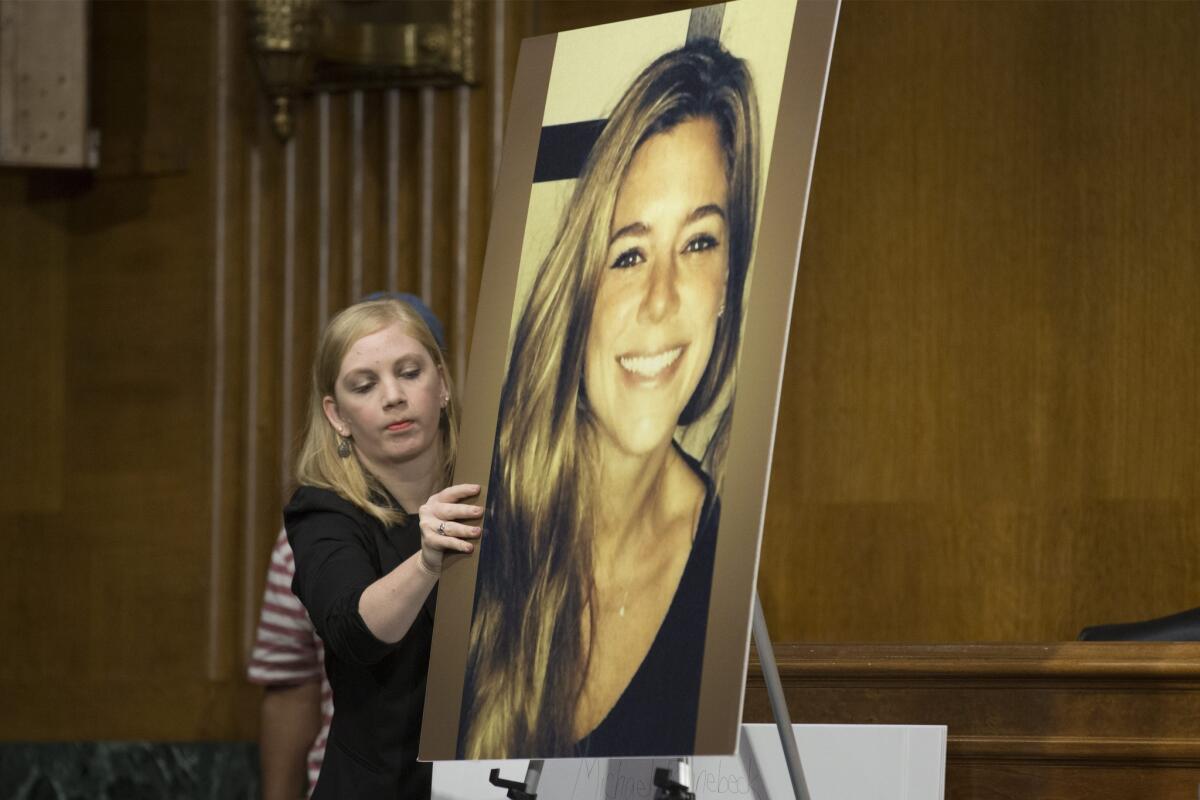White House blames San Francisco ‘sanctuary’ policy for Kate Steinle’s slaying

- Share via
The Trump administration on Friday took aim at San Francisco’s so-called sanctuary city policies, saying they were to blame for the slaying of Kate Steinle, a young woman who was fatally shot by a man in this country illegally.
“Had San Francisco enforced our nation’s immigration laws, the Steinle family would be celebrating this holiday with all of their loved ones,” the White House press office said in a statement.
Steinle was shot in the back in July 2015 as she walked with her father on Pier 14, in the heart of the city’s tourist district.
Less than an hour later, Jose Ines Garcia Zarate, a seven-time felon who had been deported from the U.S. to Mexico numerous times, was arrested about a mile away. He was soon charged in the killing.
A jury on Thursday found him not guilty in the shooting.
Trump has repeatedly criticized San Francisco and other cities that have declared themselves sanctuaries for those here illegally.
In March 2015, when Garcia Zarate finished his third federal prison term for felony reentry into the United States from Mexico, he was turned over to San Francisco on a decades-old bench warrant for alleged marijuana possession. Prosecutors declined to file charges.
ICE asked to be notified prior to his release, but city officials did not comply because Garcia Zarate did not meet their sanctuary city criteria, set in 2013, for turning over people to immigration officials.
He was freed.
There is no neat definition of a sanctuary city, but in general, cities that identify with the label seek to offer political support or practical protections to people who are in the country illegally.
For some cities, the sanctuary movement consists simply of encouraging people without legal status to get more involved in government.
Other places, including San Francisco, adopt far-reaching policies, such as taking steps to cut ties with federal immigration officials and refusing to fully cooperate with them.
San Francisco declared itself a sanctuary city in 1989, and city officials strengthened the stance in 2013 with its Due Process for All ordinance. The law declared that local authorities could not detain immigrants for federal immigration officials if the immigrant had no violent felonies on their record and did not currently face charges.
The trial hinged on whether jurors believed the killing was intentional or accidental, as the defense asserted.
Prosecutors had given the jury the option to convict Garcia Zarate of first- or second-degree murder or involuntary manslaughter.
His defense argued that the weapon went off accidentally in the defendant’s hands. (A few days before the shooting, the gun had been stolen from a federal ranger’s car parked nearby, but Garcia Zarate, who said he found the gun, was not charged with that crime.)
During the trial, Garcia Zarate’s attorneys called an expert who testified that it was an unintentional ricochet shot that killed Steinle.
The prosecutor presented evidence that the pistol required a firm pull of the trigger to fire and that Garcia Zarate threw the firearm into San Francisco Bay after Steinle fell, according to the San Francisco Chronicle. A crime-scene inspector also testified that the defendant would have had to have intentionally aimed the gun at Steinle for the bullet to follow the path it did.
Jessica Vaughan, director of policy studies at the Center for Immigration Studies, a Washington, D.C., think tank that advocates for restrictions on immigration, said she had been following the case closely and was surprised at the verdict.
She knew the jury had been deliberating for several days, but thought it was trying to decide between involuntary manslaughter and second-degree murder.
“I was very shocked that they bought into this idea that this was some accident that he shouldn’t be held responsible for,” Vaughan said. “I was very surprised and saddened for the Steinle family with this very controversial and unsatisfying verdict.”
Angelica Salas, executive director of the Coalition for Humane Immigrant Rights of Los Angeles, in a statement Fridaycriticized President Trump’s response to the verdict: “Kate Steinle’s killing by Jose Garcia Zarate is a senseless tragedy and our hearts go out to her family. Although a jury found Mr. Zarate not guilty of murder, President Trump, once again chooses to ignore all common sense and poisons a nation’s wound by doubling down on racist and xenophobic rhetoric that makes all of us less safe.”
More to Read
Sign up for Essential California
The most important California stories and recommendations in your inbox every morning.
You may occasionally receive promotional content from the Los Angeles Times.















